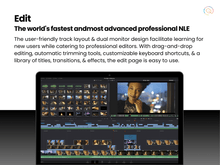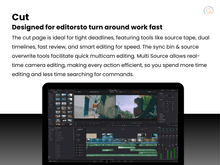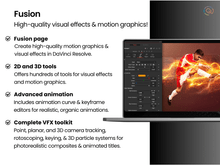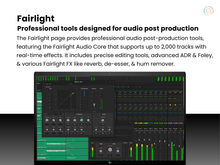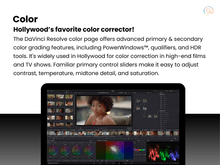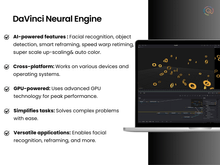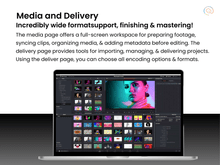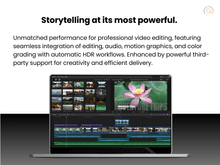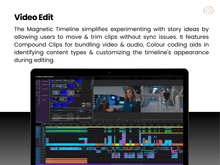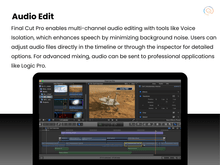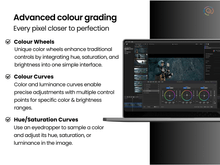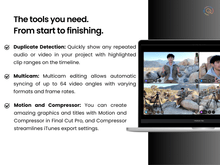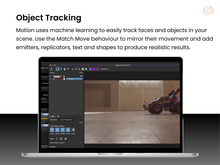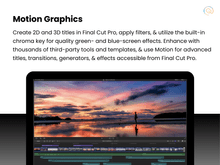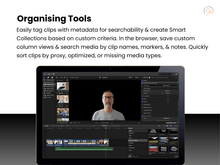DaVinci Resolve and Final Cut Pro are both powerful video editing software used by professionals and editors. Each has its own strengths and weaknesses, with a varied range of tools, effects, and workflows.
Both the software offers a great starting point for performing basic to advanced editing functions, which makes the choice between DaVinci Resolve or Final Cut Pro difficult. To make this decision easy, we have compared DaVinci Resolve vs Final Cut Pro based on key features, interface, integration capabilities, and pricing.
DaVinci Resolve vs Final Cut Pro: Overview
DaVinci Resolve and Final Cut Pro are two of the most popular NLEs (Non-Linear Editors), and both are the go-to-choice of most editors due to the distinctive features they offer. However, there are some key differences between DaVinci Resolve and Final Cut Pro in terms of interface, compatibility, and editing tools.
DaVinci Resolve was introduced by Blackmagic to perform post-production editing with an emphasis on color grading. The professional software is equipped with features to merge audio and video inputs, make edits, add motion graphics, and so on. This tool gives users a professional experience and allows complete control over video projects.
Final Cut Pro, on the other hand, is developed by Apple for creating high-quality videos. The software has an intuitive interface and a range of features, including colour correction, audio mixing, multi-camera editing, and more. This makes Final Cut Pro an ideal choice for simple video editing projects.
Key points of difference between DaVinci Resolve and Final Cut Pro are device compatibility and user interface. Final Cut Pro is a user-friendly video editing tool that operates only on Mac devices, while DaVinci is a more advanced post-production editing software that is compatible with most operating systems.
DaVinci Resolve vs Final Cut Pro: Pros and Cons
- Final Cut Pro has a simple interface, helping users to perform basic as well as advanced projects with ease. DaVinci on the other hand, has a complex interface that needs technical expertise to operate.
- While the free version of DaVinci Resolve is equipped with multiple video editing features, Final Cut Pro does not offer a free version.
- DaVinci Resolve enables cross-platform editing capabilities and is accessible on Windows, Mac, as well as Linux. Final Cut Pro, however, can only be used on Apple devices.
- One advantage of DaVinci Resolve is that Blackmagic keeps working on updating speed and features. Final Cut Pro on the other hand does not introduce great enhancements to the software.
DaVinci Resolve vs Final Cut Pro: In Terms of Features
- Cross-Platform Support: A key difference between DaVinci Resolve and Final Cut Pro is that Final Cut Pro only works with MacOS while DaVinci Resolve provides cross-platform compatibility. This makes DaVinci Resolve a better choice for users working on multiple platforms.
- Speed and Performance: Between the two video editing software, Final Cut Pro has a better rendering speed, enabling users to do a high volume of work in less time.
- Color Grading: In terms of color grading and fixing features, DaVinci Resolve is a better choice compared to Final Cut Pro. The software comes with magic mask feature, compositing, and powerful graphics to perform more complex color-grading tasks.
- Effects and Transitions: While both software have amazing transitions and effects, you need plugins to enhance the editing experience with Final Cut Pro. Meanwhile, DaVinci is packed with built-in effects and motion graphics.
- Audio Editing: DaVinci handles audio editing projects using a built-in audio workstation called Fairlight. While it is an extensive audio editing tool, Final Cut Pro makes it easier to edit audio with Logic Pro, a user-friendly audio editing workstation.
- Video Rendering: In terms of performance and speed, Final Cut Pro outperforms DaVinci Resolve with streamlined exports and responsive application. The background rendering feature of Final Cut Pro enables an uninterrupted workflow.
- Supported Formats: While DaVinci supports all the file formats, Final Cut needs plugins to access formats like RED Raw which are natively offered by DaVinci Resolve.
DaVinci Resolve vs Final Cut Pro: Interface
The interface of both DaVinci and Final Cut Pro is clean and simple. While DaVinci Resolve offers a traditional timeline for free-form editing, Final Cut has a magnetic timeline where clips can be attached for creating compositions.
In terms of user-friendliness, Final Cut Pro has an easy-to-use interface, offering all essential tools on one screen. DaVinci Resolve, on the other hand, has a more complex interface, segregating workflows into different tabs.
DaVinci Resolve vs Final Cut Pro: Collaboration
DaVinci wins this round of comparison between DaVinci Resolve and Final Cut Pro. The software can operate across different platforms and supports integration with third-party applications like Adobe Photoshop and After Effects.
Final Cut Pro can only operate on Mac devices and requires plugins to integrate with other designing tools, making collaboration difficult for users.
DaVinci Resolve vs Final Cut Pro: Integrations
Final Cut Pro offers integration with Apple Motion for motion graphics and DaVinci Resolve primarily integrates with Fairlight and Fusion for audio editing and visual effects, respectively.
In terms of third-party integrations, Final Cut Pro offers more plugins for enhancing video editing projects. DaVinci Resolve, on the other hand, supports plugins that enhance specific editing functions rather than providing ready-made customizable elements like that in Final Cut Pro.
DaVinci Resolve vs Final Cut Pro: Pricing
When it comes to pricing, DaVinci Resolve and Final Cut Pro offer similar pricing options. At a flat fee, users can optimize all the features of these two applications. The differentiating point, however, is that DaVinci offers more features at the same pricing range.
Another point of difference between DaVinci Resolve and Final Cut Pro is that DaVinci offers a free version with all the functionalities needed by beginners. Final Cut Pro is completely paid software with a 90-day demo version.
Which Is Better, DaVinci Resolve or Final Cut Pro?
Both DaVinci Resolve and Final Cut Pro are advanced video editing tools with extensive features and capabilities. Choosing between the two depends on the user’s needs and understanding.
Contrary to the complex interface of DaVinci Resolve, Final Cut Pro has an intuitive interface with beginner-friendly features. Resultantly, Final Cut Pro is ideal for performing quick and simple editing processes and DaVinci Resolve works wonders for advanced and complex editing projects.
However, Final Cut Pro does not work on operating systems beyond MacOS, while DaVinci Resolve works well with Windows, Mac, and Linux. Lastly, the value for money is more in DaVinci, thanks to the array of features it offers in the free version.


 16 Ratings & 13 Reviews
16 Ratings & 13 Reviews











